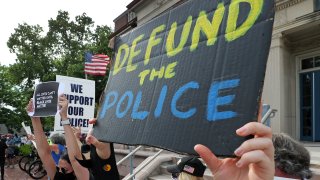
2020 appeared to be a year of racial reckoning in the United States. The fight against systemic racism reverberated throughout the country with protests, boycotts and calls to “defund the police.” But, a year after slashing police budgets in response to the growing defund movement, many cities have restored the funding — seeming to confirm activists’ suspicions that city leaders weren’t serious about the change in the first place.
At least a dozen cities cut their police funding or decreased officer numbers during last summer’s protests against police violence following the killing of George Floyd in May 2020. But one by one, city governments began to bolster their police budgets in 2021, with an additional $200 million allocated to the New York City Police Department and the Los Angeles Police Department seeing a 3 percent increase in the year after the city council approved a $150 million cut.
Among politicians, the idea of defunding the police certainly was unpopular. Then-presidential candidate Joe Biden said last summer that he doesn’t support defunding the police, but supports “conditioning federal aid to police based on whether or not they meet certain basic standards of decency and honorableness.”
Police and city officials from New York to Los Angeles have cited rising violent crime rates for the reversals, but experts have noted that crime rates fluctuate for various reasons and shouldn't be solely attributed to police budget cuts. Police staffing shortages and political pressures also contributed to the reversals in several cities. In cities like Burlington, Vermont, that have slashed police budgets, city leaders have struggled to adequately address public safety without relying on traditional policing.
Get top local stories in Philly delivered to you every morning. Sign up for NBC Philadelphia's News Headlines newsletter.
Read the full story here on NBCNews.com

